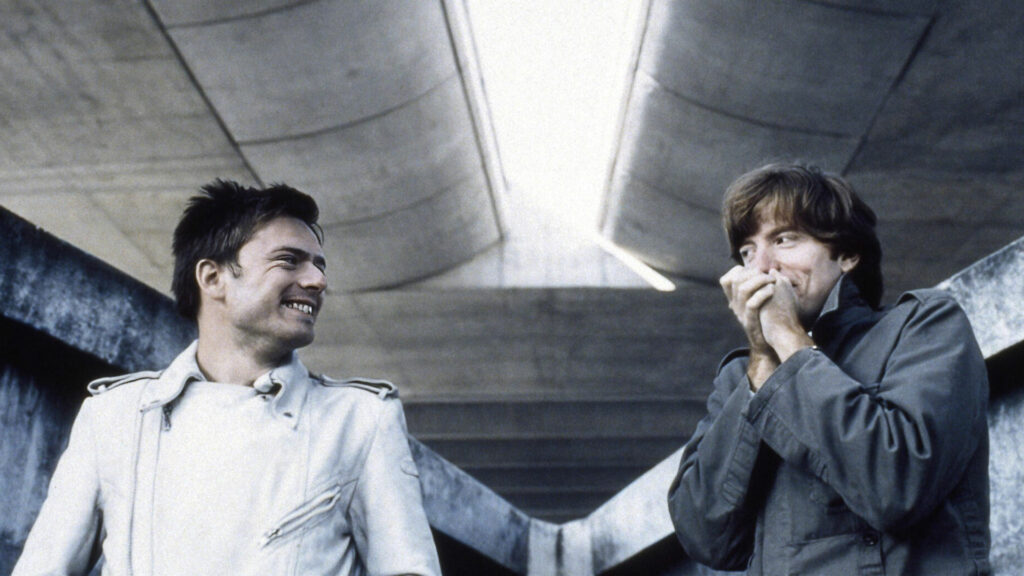I was a little apprehensive when Yung Lean lyrics went viral earlier this year and in the space of what seemed like a millisecond ‘Ginseng Strip 2002’ seemed to be in every Instagram story, blah, blah, blah. Too late to explore the world, just in time to see happy smiling couples whispering to one another that ‘bitches come and go brah, but you know I stay’.
Colour me anxious when I assumed we’d later see the return of the bucket hat phenomenon in this hyperculture of eternal recurrences. Fortunately, it seemed like many TikTokers took the time to listen to more than fifteen seconds of the track to discover some naughtier (problematic) lyrics, and just like that ‘Ginseng Strip 2002’ seemed to disappear into the cloudy ether where it now rests in peace for all eternity.
Unseen by the ponder orb was Lean’s sudden disappearance from Twitter altogether; who knows if these events were connected? Perhaps Elon Musk’s buy-out of the social media service was based on the proviso that the Swedish rapper deletes his account or – more likely – the sad boy king himself was finally fed up with it all.
How delighted I must have been then when one afternoon of living-crisis doomscrolling resulted in algorithmic reality delivering into my peripheral vision a new Yung Lean album entirely.
‘Stardust’.
Sounds a bit like the previous album, ‘Starz’, doesn’t it?
Except this offering – named after the dust that glitters from the sun – ends up sounding less lonely, populated by more sounds and voices as if the necessity of floating out into the absences of deep space was the only way for Yung Lean to discover a world that was bigger than himself.
I’m not going to spend too long writing about this album, but I am going to use it as an example of the underlying Referentialism that Lean’s work utilises in an attempt to encapsulate a growing sense of this world’s accelerated interconnectivity.
The driving force behind this interconnective reality – the increasing reliance on self-reference and allusion – seems undoubtedly concerned with the reworking (decentralisation) of genre and boundary, that which seeks to dissolve the hegemony of long-established cultural partitions whilst imparting a growing sense of the hyperculture itself. Well – what the fuck does that mean?
Byung-Chul Han’s 2022 book, ‘Hyperculture’, suggests the ‘pressing task for the philosophy of culture is to develop a model that is able to capture today’s cultural dynamic.’
In the chapter on ‘Hypercultural Identity’, Han points to a world in which ‘Contexts that provide meaning and identity are disappearing’ the ‘symptomatic results’ becoming that of ‘fragmentation […] and pluralization.’ He writes on page fifty-one: ‘When the horizon disintegrates into multicoloured possibilities, you can cobble together an identity from these parts.’
Would it be fair to say that Yung Lean epitomizes not only the ‘multicoloured possibilities’ of genre-hybridity in the face of this ‘disintegrated reality’ but an ‘identity’ which has been ‘cobbled together’ out of the alienation once felt in Jonatan’s bedroom? Of course, it would be ridiculous to suggest that this space of ‘multicoloured possibilities’ was limited to just one artist, which is precisely why ‘Stardust’ opens with the collaboration – ‘Bliss’ – featuring FKA twigs – an artist once described by ‘Vanity Fair’ as ‘genre-bending’.
The accompanying audio-visual element to ‘Bliss’ – to say, that thing we once called a music video – is immediately predicated upon a Referentialism of sorts. To say, in the first thirty-seconds or so there are two allusions to an outside reality worth mentioning; firstly, there is the widely memed reference to Nelly and Kelly Rowland’s 2002 collaboration, ‘Dilemma’, where we see FKA twigs staring out a bedroom window longingly, attempting to message Yung Lean via excel spreadsheet.
Lean’s very first lyric is also significant here – ‘The key and the gate, it’s a Leanworld’ – delivered as a very direct reference to Lean’s debut studio album, ‘Unknown Memory’, showing listeners that despite the years, despite the critics and a maturity in sound, we’ve never really strayed all that far from Lean’s seminal works, one of which is this referenced track – ‘Leanworld’ – which should be considered here, in some small way, as a creative pastiche of Nelly’s ‘Nellyville’. Except the hyperfamiliarity of the American suburb – once realised by Nelly and Rowland in their own music video – is replaced by the rural loneliness of a European one. A fascination with that 2002 R&B track collides with the drama of alienation, the lonely creativity of bedroom appropriation, the haemorrhaging between worlds and genres where the conventions of cloud rap were initially realised to produce something entirely blissful, the manifesto of such hyper-forms once spoken in Lean’s ‘Unknown Death 2002’, when he sung, ‘No one heard about Lean a month ago, ago / I was in my bedroom making music, yo.’
Nevertheless, it is Byung-Chul Han’s contention that ‘globalization de-auratizes culture and turns it into hyperculture.’ Once again, on page thirty-six of his text on ‘Hyperculture’, in reference to the chapter on ‘The De-Auratization of Culture’, Han writes that, ‘Under conditions of hyperculture, different forms or styles from different sites and ages are de-distanced in a hyper-present.’
It could be said that hip-hop as a genre then –a genre like R&B, in addition – having been thoroughly commodified and sent global, entered into the realm of the ‘hyper-present’, its positionality as a genre having ‘become detached’ from its ‘spatial-historical embeddedness’ to use Han’s terminology. Would the model of hyperculturality explain the perfectly reasoned – although somewhat appropriated – allusion to Nelly and Rowland’s ‘Dilemma’ that can be found in Yung Lean and FKA twigs’ ‘Bliss’?
Before concluding his short text with an equally terse chapter on the ‘hypervision’ of Nietzsche’s ‘wanderer’ – a wanderer whose world ‘is still peppered with deserts…’ – Byung-Chul Han considers the phenomenon of ‘Appropriation’. The philosopher and cultural theorist writes:
‘In recent times, the paradigm of the ‘Other’ or the ‘radically Other’ has been introduced into many humanities disciplines, and since then appropriation has come to be seen as something rather sinful. […] Appropriation is not per se violent. Colonial exploitation, which destroys the Other in favour of itself and of the Same, must be strictly distinguished from appropriation. Appropriation is an essential part of education and identity. Only an idiot or a god could live without appropriation. […] Without appropriation there also is no renewal. Hyperculture desires such appropriation; it enjoys the novel. It is a culture of intense appropriation. The one who appropriates the Other does not remain the same. Appropriation leads to a transformation of one’s own. Therein consists the dialectic of appropriation.’
Dialectics aside, who would have thought that after all that talk of the ‘violence of transparency’ and toxic positivity operating as the modus operandi of Western reality, Han would arrive at a thoroughly Baudrillardian ‘philosophy of culture’, writing: ‘On the model of the term hyperculturality, it could be called hyperreality.’
It is demonstrable in the culture today, just as it is demonstrable in the music of Yung Lean and elsewhere, that hyperreality is here to stay, and yet ‘De-sited, de-auratized cultures’ are not, in the words of Byung-Chul Han, ‘…replications devoid of any authenticity. They achieve another Being, another reality, which shines in the absence of the auratic.’
If it is true that we have entered the ‘threshold’ of another way of Being in the world then could it be argued that the ongoing attempts to ‘correctly’ reorient the referential positionality of our culture’s ‘spatial-historical embeddedness’ away from the ‘hyper-present’ is a neo-reactionary project that belongs to the Contemporary Left just as much as it belongs to the Political Right?
Perhaps it is not for me to say.
SUN 03 JUL 2022
Alex Mazey will take over our Discord Radio

Cover photo by Sadboys Entertainment
Next story


